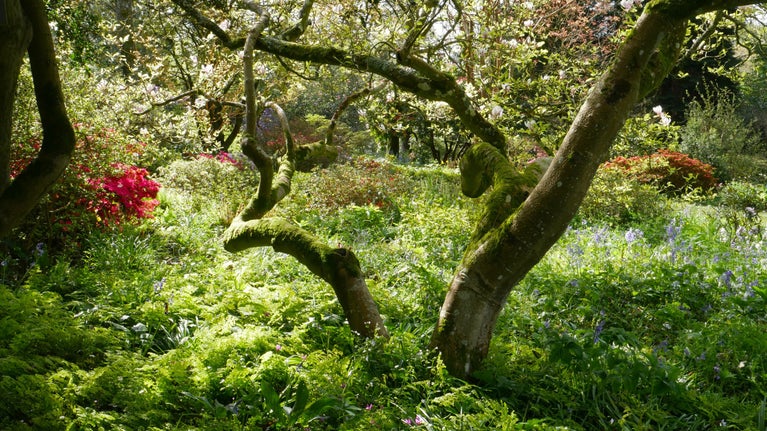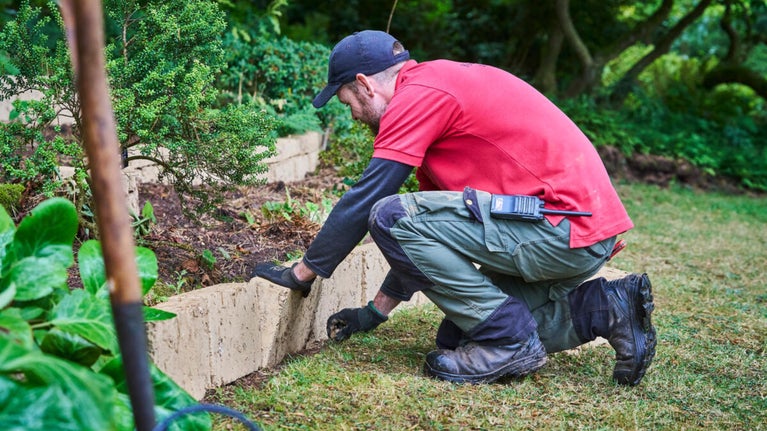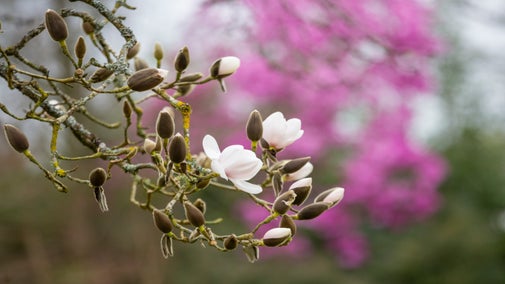
Discover more at Knightshayes
Find out when Knightshayes is open, how to get here, the things to see and do and more.

Tucked away beyond the formal lawns and topiary yews of Knightshayes lies a garden unlike any other - a botanical haven set within a woodland.
The Garden in the Wood is a rare example of a botanical garden laid out in such a woodland setting, making it a truly special place to explore. Originally created by Sir John and Joyce, Lady Amory after the Second World War, it was designed to showcase rare and unusual plants cultivated on the estate, nestled among dappled glades and winding paths.
Now, this hidden treasure is undergoing a thoughtful restoration, one that’s not only reviving its horticultural legacy but also revealing long-forgotten secrets beneath the soil.
Led by Senior Gardener John Ridgley, the Knightshayes team is breathing new life into the Garden in the Wood using sustainable techniques and a deep respect for its history. The project is part of the National Trust’s People and Nature Thriving strategy, which aims to restore nature, inspire care for special places, and make beauty and history accessible to all.
One of the most experimental aspects of the restoration has been the trial use of cob blocks, a mix of straw, clay and water typically used in house building, not gardening. These were tested as a potential replacement for degraded peat blocks to raise the terraced beds. However, following heavy rainfall the cob blocks suffered some degradation, and so the team has halted their further use for structural purposes. A proposed mix using bio-char and bracken compost to darken the blocks has also been paused. Instead, the team is now turning to estate-sourced timber lengths, rounds and split rounds as a more robust and sustainable solution, while continuing to explore suitable alternatives for key visible areas of the garden.
As the team digs new beds and clears overgrown areas, they’re uncovering more than just soil, they’re rediscovering the original layout of the garden. Forgotten paths are being revealed, offering glimpses into how the Heathcoat-Amory’s once envisioned the space. In one particularly exciting moment, an unusual orchid was found growing quietly beneath a thicket of ‘thuggish’ plants, its delicate form a reminder of the garden’s rich botanical legacy.
The restoration is being driven not only by staff but also by a growing team of volunteers. “This is a tailor-made opportunity for someone who wants to learn about plants,” says John. “It’s not just weeding—it’s planting, maintaining, watering, feeding, mulching, pruning. All sorts of stuff.”
What began with no dedicated volunteers has grown into a committed group of eight regulars, all eager to learn and contribute. An Exeter NT volunteer group has also played a key role, clearing ivy, Lamium, and wood sedge to prepare the ground for replanting.
Between January and June 2025, the team focused on planting along the newly developed Church Path, revitalising the nursery with shade tunnels, plunge beds, and cold frames to support propagation and seed sowing. A powered water bowser aids irrigation during dry spells, while a trailer helps transport compost, mulch, and remove weeds.
The Garden in the Wood is designed to offer interest from early spring through to autumn, with collections of Magnolia, Rhododendron, unusual trees and shrubs, bulbs and herbaceous plants. Its woodland setting creates a unique atmosphere: intimate, shaded, and full of surprises.
“I’m working on my favourite part of my favourite garden,” says John. “And I’ve gardened a few and I’ve visited a lot, so I’m allowed to say that! I’m loving it.”
As the restoration continues, visitors will be able to witness the transformation firsthand, watching as rare plants return, sustainable materials take root, and a historic garden is rediscovered.

With your ongoing support, we're able to continue our vital conservation work. Thank you for helping to protect these special places.

Find out when Knightshayes is open, how to get here, the things to see and do and more.
Discover the formal and woodland gardens at Knightshayes in Tiverton, Devon, laid out as eight separate areas plus a walled kitchen garden.

Discover the ground floor of house at National Trust’s Knightshayes. See the details behind architect William Burges's gothic façade and a portrait that may be by Rembrandt. From Saturday 14 February the first floor of the house will also reopen for a peek into the private spaces of the Heathcoat-Amory family.

There are acres of parkland to discover at Knightshayes. It's a great place for the whole family to explore with room to roam with plenty of hidden corners to discover.

Grab a bite to eat and drink in the Stables Café, or browse the range of goods in our shop. You'll find all the details here.

We believe that nature, beauty and history are for everyone. That’s why we’re supporting wildlife, protecting historic sites and more. Find out about our work.

Read about our strategy, which focuses on restoring nature, ending unequal access and inspiring more people.
